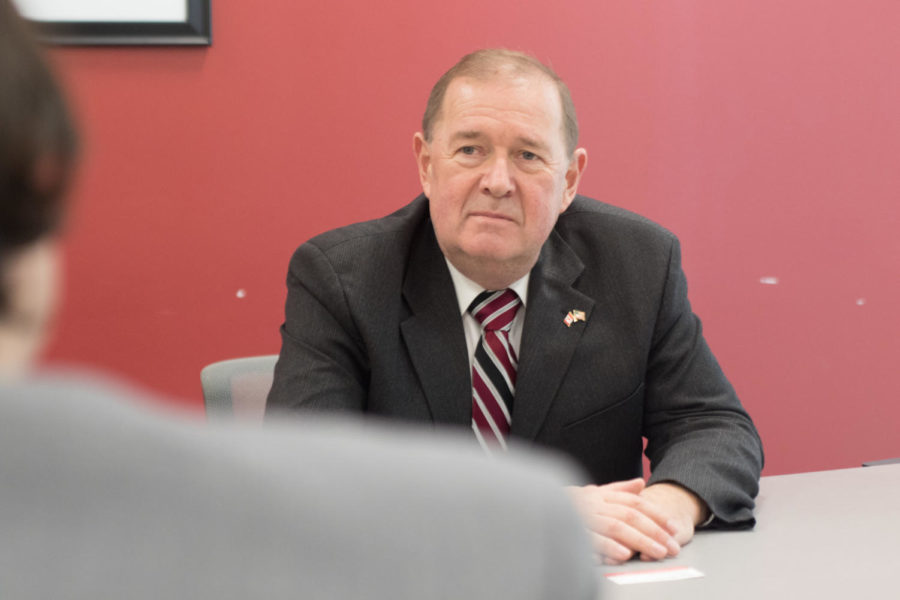Canada’s consul general visit Iowa State, talks NAFTA
Chris Jorgensen/Iowa State Daily
Canadian Consul General Paul Connors visited Iowa State on Thursday, Jan. 25.
January 28, 2018
Iowa exported more than $4.4 billion of products to Canada in 2016, the largest export market for Iowa.
Canadian Consul General Paul Connors visited Iowa State on Thursday to promote NAFTA, the North American Free Trade Agreement, and talk about the ongoing negotiation process taking place between Canada, Mexico and the United States.
Connors granted the Daily an exclusive interview on Thursday afternoon.
Connors serves in the Canadian Consulate in Minneapolis which operates in Minnesota, Iowa, Nebraska, North Dakota and South Dakota.
“The largest export markets for the United States are: Canada’s the largest, Mexico is the second largest,” Connors said.
Connors noted the cyclical nature of the trade relationship between Iowa and Canada. According to Agriculture and Agri-Food Canada, Iowa exported $839 million to Canada in agricultural products alone in 2016. In turn, Iowa imported $553 million from Canada.
The largest export from Iowa was animal feed. The largest import from Canada was live animals, namely pigs, which were slaughtered and processed in Iowa. Iowa then exported $110 million of fresh and frozen pork to Canada, Iowa’s third largest export to Canada.
“For the Canada piece [in 2016], two-way trade between our countries with 635 billion dollars,” Connors said. “That’s almost 2 billion dollars a day.”
While Connors acknowledged that President Trump has changed his position on NAFTA several times, he felt that NAFTA is beneficial to all three countries involved and believed each country is motivated to reach an agreement.
Agriculture and Agri-Food Canada estimates that nearly one in 17 jobs in the United States relies on trade and investment with Canada. Canada imported more agricultural products from the United States than any other nation in 2016. Canada is also in the top five of agricultural export markets for 48 of the 50 states.
The countries still disagree on several key portions of the agreement including a proactive renewal process every five years rather than an open-ended agreement.
Connors felt that this uncertainty every five years could lead investors to be concerned and reluctant to invest in what could be an expiring agreement.
Another issue that Connors spoke about was what would be a large increase in tariffs between the three nations. Currently the three countries are able to trade free of tariffs. NAFTA has been a largely-bipartisan effort, first in effect under the Clinton administration in 1994.
“It’s an incredibly positive economic relationship the three countries have achieved,” Connors said.
Connors did note that Vice President Pence recently voiced his support for the United States to remain in NAFTA and said he did not see why all three of the countries would not do their best to have a successful renegotiation of NAFTA and continue their trade relationships.
Connors felt that the United States and Canada have one of the strongest alliances in the world, noting recent examples of mutual aid between the nations including tradespeople from Canada helping rebuild in the United States after natural disasters.
Connors also discussed the amount of oil and natural gas the United States imports from Canada.
The sixth round of negotiations, currently taking place in Mexico, will end on Monday. If approved, the seventh round of negotiations will take place in Mexico on Feb. 26. Negotiators have a goal of reaching an agreement by March 31 to avoid conflicting with impending election cycles in both Mexico and the United States.







